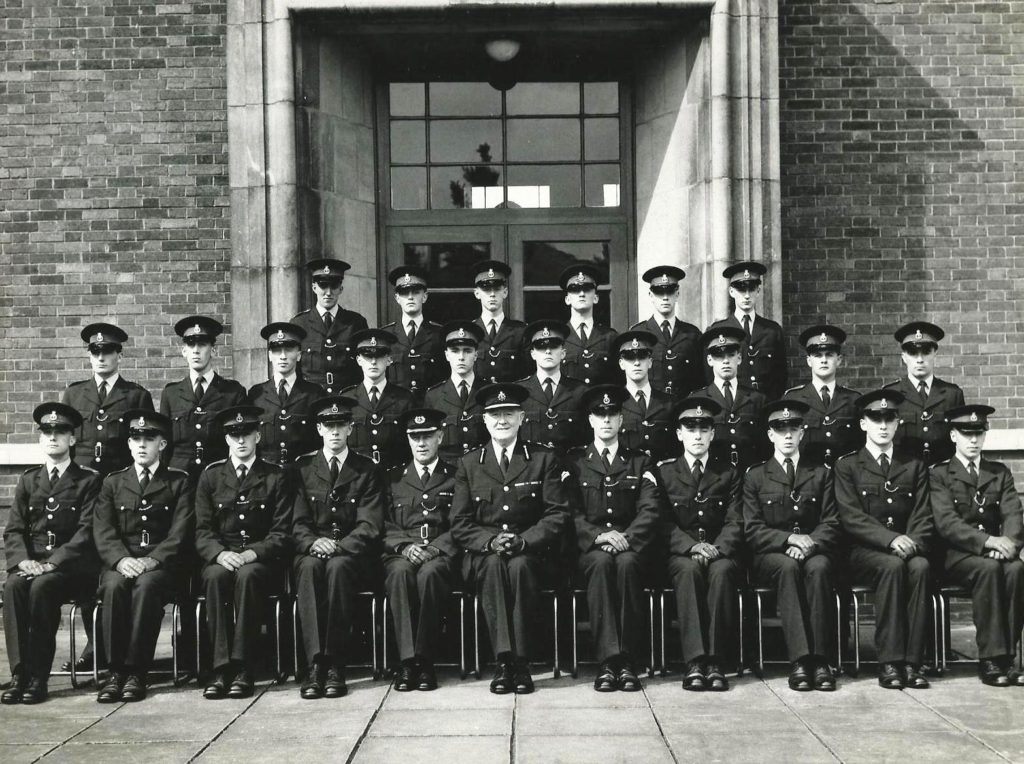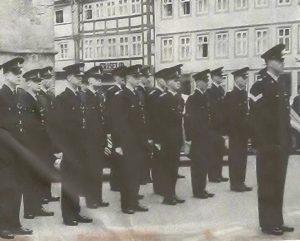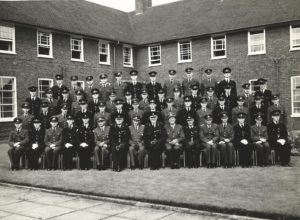CADETS WEST GERMANY 1958 by john edwards, retired
City Police Invited to West Germany 1958
The visit was initiated in the summer of 1958 when three Liverpool City Police Cadets – Roger Heath, Dave Morris and Brian Tinsley – went to the Travel Bureau in Lewis’s Store in Liverpool City Centre. They wished to book an overseas holiday. One of the staff of the bureau at the time was a West German national and when he found that the three young lads were police cadets it set in motion an invitation from the West German Government for a party of police personnel to visit West Germany. The West German Government after WW11 wished to mend and foster good relations with other countries. The Liverpool City Police party consisted of the Chief Constable, Sir Charles Martin, his wife Lady Martin, Chief Superintendent Cyril Hegg and 24 Police Cadets. The visit was to be for two weeks.
The names of the 24 cadets were Dave Anderton, Alan Bonner, Frank Breen, Anthony Brown, John Callaghan, Tom Chamley, Michael Chapman, Russell Clarke, Roger Corker, Eric Dixon, Dave Feeley, Dave Fry, Ian Hayes, Roger Heath, Bob Jamieson, Geoffrey Johnston, Peter Johnston, David Liptrot, Dave Morris, Richard Murphy, Tony Nash, Rodney Salisbury, David Skinner and Brian Wylie.
Mr Hegg suggested that one of the Cadet instructors should be in charge of the Cadets and not him. Consequently, Sir Charles asked Inspector “Taffy” Pugh would he like to be included in the party. Mr Pugh said he would be delighted and he would speak to his wife about the invitation. Mr Pugh waited for further communication from the Chief Constable but found in not giving a direct and immediate affirmative answer that Sergeant “Bill” Hillier was being asked would he like to go with the party to West Germany. Bill, a Cadet instructor, had only recently returned to duty after a major operation and Sir Charles suggested it would be good for him in recuperating from his hospitalisation. Bill gave the same answer as Mr Pugh that he would speak to his wife about the matter. At the time, I was a constable and seconded from “A” Division as an Acting Sergeant and Cadet Instructor whilst Bill was in hospital. I thought that if Bill declined to go on the trip then I would give an affirmative answer if asked having spoken to my wife who raised no objection. Bill was not asked again but I was. I agreed to go.
The cadets were all volunteers and they and myself were required to pay for our travel expenses
(train and ferry) to and from Liverpool and Ostend. On the continent all expenses were to be paid for by the West German Government. Nevertheless, the cadets thinking the venture was for a fortnights holiday were rather angry to find that the visit was an international public relations exercise and they would be classed as ‘On Duty’. Also, they had to pay out of their own pocket albeit only in part.
At Ostend we were conveyed in a police coach to Hann.Munden, a beautiful and historic town to the south of Hannover. The route was via Brussels, Liege, Aachen, Cologne, Kassel – a journey of over 360 miles that took 17 hours with one meal stop. We did not proceed along any autobahn. The coach was far from being a “cumfy” coach as it had no bonnet and the huge engine was inside the coach by the driver. For those in the front seats the heat was most uncomfortable. We arrived in Hann.Munden near to midnight a very tired party. Our accommodation was in a barrack block of the training academy of the Niedersachsen Police. The Cadets were in small dormitories but Mr Hegg and I both had a room each.
Our first impression of the German police students was one of strict discipline – they marched in column around the barracks and singing German marching songs. They wore the German police helmet and not caps. Before entering a room they would come to attention and click their heels and bow their head before entering. (Later I was told that the marching, singing, helmets and bowing was only to impress us during our stay and was not the usual practice). Mr Hegg was known for his strict discipline in his Division, although it was said he was very good to his men regarding welfare matters. He wanted to show the Germans that the Cadets discipline could match that of the Germans. Throughout the fortnight I was required to show Mr Hegg that the Cadets were contained in strict discipline whilst I was required to show Lady Martin that the Cadets were enjoying themselves as if on holiday. It was somewhat of a balancing act and I thought the scales would show that the Cadets were somewhat resenting me. I was therefore surprised near the end of our stay to be told by a Cadet that I was wanted in one of the Cadets dormitories. Thinking something was amiss I was totally surprised when I saw all the cadets were present and I was presented with two large German stein mugs which I know are very costly. Those mugs are on view and prominent in my home reminding me of the caring attitude of those twenty four cadets.
Mr Hegg was very pleased when he introduced to the Germans Cadet Tom Chamley, who had gliding experience to his credit.
Although we travelled in civilian clothing, the cadets and myself were told to take our uniform, as we would be attending certain official functions . These functions included the cadets in uniform being inspected in the town square of Hann.Munden by the Burgomaster. At the time of our visit the town was celebrating a Schutenfest and the cadets were given prime position behind the leading band in the procession of the shooting marksmen. On other days the cadets gave a demonstration of Continuity Drill (drill with no words of command from the instructor) in Hann.Munden, Hannover and Brunswick. Not all the 24 Cadets were those I would have selected from the 150 cadets back in Liverpool, but nevertheless they gave very good displays. They received loud applause from the spectators.
Other visits were paid in the police coach to Aachen (a magnificent huge man-made waterfall is near the town), Hamelin (where the pied piper enchanted all the children out of the town never to be seen again), the Hartz Mountains (the highest mountain range in Northern Germany), Goslar (Noted for the Kaiserhaus, an imperial palace, the greatest, oldest and best preserved building of the 11th Century in Germany), Gottingen (an historical university town. In WW11 – there was an informal understanding that if the Germans did not bomb Oxford and Cambridge then the Allies would not bomb Gottingen and Heidelberg), a visit to the Volkswagen factory at Wolfsburg and along part of the Iron Curtain with its fencing and towers.
Mr Hegg travelled in the police coach with the cadets. Sir Charles and his wife went in a police private car to all the places visited by the cadets. They had their meals with senior German police officers.
The cadets were allowed two free days to find their own entertainment. It was only on a few occasions when cadets were not on visits that they were allowed to go into Hann.Munden.. At the time of our visit there was a large fair in the town. I was invited by three young German instructors to go with them for the evening. They learnt that I had a young son. They took me to the fairground and with their expertise at shooting they won the premier prize at a shooting gallery. It was a very large toy teddy bear which they presented to me. We then went to a very large Beer Tent. On the insistence of the three instructors the teddy bear was placed in a prominent position on the long bar counter. I was apprehensive that some person would steal it but I was told it would be safe. We then started a drinking session. I did not get drunk and I kept looking towards the bar to see if the teddy bear was still there. At 3am I saw that the teddy was not there. The three instructors fervently searched the area but it had been stolen! We returned to the Academy at 5am with little said on the way by the three instructors – they were embarrassed about the loss. In the days following, if I saw one of the three instructors coming towards me they avoided me by diverting.
On the last evening of our stay entertainment was provided on stage by the German police students. One of the songs of the Police Students Choir that they had rehearsed and learnt to sing it in English was “Sailing Back to England” They were very proud in doing so thinking it was a popular song in England. Unfortunately, they were most disappointed to learn that we did not know the song.
After the entertainment had concluded one of the three instructors came to me and requested I accompany him to the bar. There I saw that one of the other two instructors was holding a teddy bear which was presented to me. Apparently, they had returned to the fairground to win a second teddy bear for me!
The return to Ostend in the German police coach was not too tiring as at Aachen we were accommodated overnight in German police premises. The following day we continued on our way but we were treated by the German police to a visit to the World Fair at Brussels and then we were taken to Ostend.
The visit of cadets to West Germany was reciprocated when a police party from Hann.Munden came to Liverpool for a two weeks stay. Major Vagts was in command and he was accompanied by two officers. One was named Juretsky (he was very popular with the Liverpool cadets as on journeys in the coach in West Germany he taught them to sing German songs in German. Whether he was popular with his own Police Students I do not know. He was responsible for their discipline). The other officer was Herr Flemm, and his role was, as it was in West Germany, the interpreter. The fourth staff member was Probst. He was the “Sergeant” of the German party. During WW11 he was a parachutist in the German Army.
The German party received a reception from the Lord Mayor of Liverpool at the Town Hall. It was the only occasion during their stay when they were dressed in police uniform. Other places that they were taken to included the Southport Flower Show. Sir Charles was a friend of the Chairman of the North Wales Steamship Company. At no charge the German party together with Liverpool senior police officers and cadets were taken from Liverpool to Llandudno by ship. On the way a free lunch was enjoyed by the party. On the return to Liverpool, the ship’s purser asked if the party would like to sit for the dinner meal. This was answered in the affirmative with delight. A few days after the trip Sir Charles received an invoice from the shipping company. It was for the dinner meal – it was not free. It amounted to over £300. Sir Charles told Chief Inspector McHugh, in charge of the Training School, that the Watch Committee budget for the German stay would not allow such payment and therefore other means would have to be found. After much debate it was decided to pay the bill from the funds of the Liverpool City Police Cadet Corps Club.
The four members of staff of the German Party and senior officers of the Liverpool City Police, including Mr Herbert Balmer, ACC, who was responsible for the itinerary of the German Party during their stay, where invited to dinner aboard the P.S.N.C ship s.s. “Cuzco, berthed in Huskisson Dock. Inspector Cyril Woolham, who was a fluent German speaker, and myself were also invited. It was a sumptuous meal of eight courses which must have greatly impressed the German officers. After the meal Major Vagts made an appreciative speech in German and Herr Flemm gave the English translation. Herr Flemm was a fluent English speaker but when he came to pronouncing “The Pacific Steam Navigation Company” he was unable to do so. He made quite a few attempts, with laughter from those gathered, and in the end Cyril Woolham had to pronounce the words for him.
It is known that some Liverpool cadets have visited, privately, Hann.Munden and individual German police students have returned to Liverpool. Friendships came about because of the two visits – one to Hann.Munden and the other to Liverpool.
John Edwards
May 2013
Group Photograph -Liverpool City Police Party – German Visit
Back row: Wylie, Feeley, Morris, Breen, Nash, Hayes.
Middle Row: Clarke, Dixon, Fry, Chamley, Johnston, Johnston Brown, Skinner, Salisbury, Jamieson.
Front Row: Bonner, Anderton, Liptrot, Heath, Ch Supt Hegg, Sir Charles Martin, A/Sgt Edwards, Murphy, Corker, Chapman, Callaghan.
Note the glum faces of the cadets when they were told the visit was not to be a holiday but that they would be carrying out duties.




